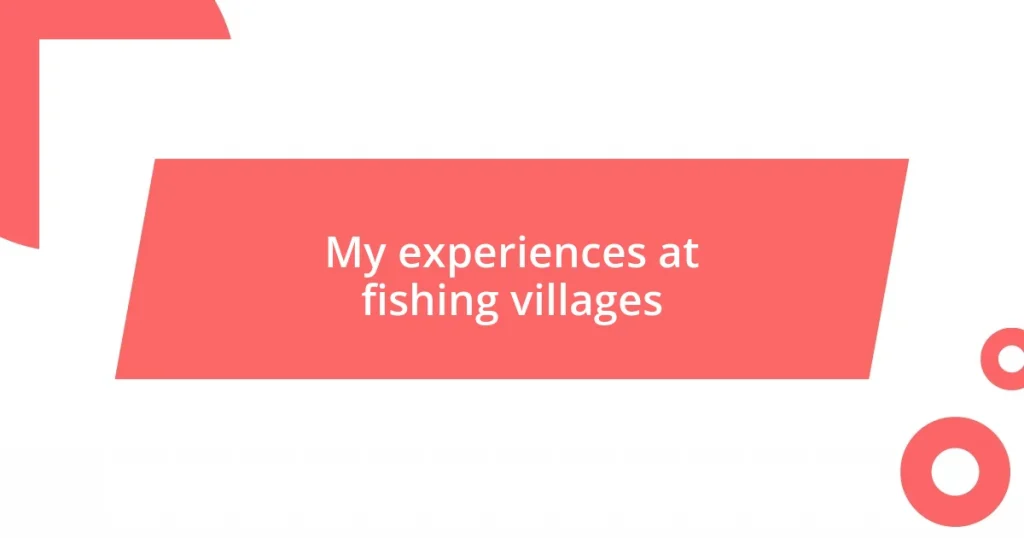Key takeaways:
- Fishing villages thrive on a rich heritage and strong community bonds, with local traditions deeply rooted in their maritime culture.
- Experiences such as local festivals, communal meals, and traditional craftsmanship offer unique insights into the culture and identity of fishing communities.
- Sustainable fishing practices are essential for preserving marine ecosystems and ensuring the longevity of fishing cultures for future generations.
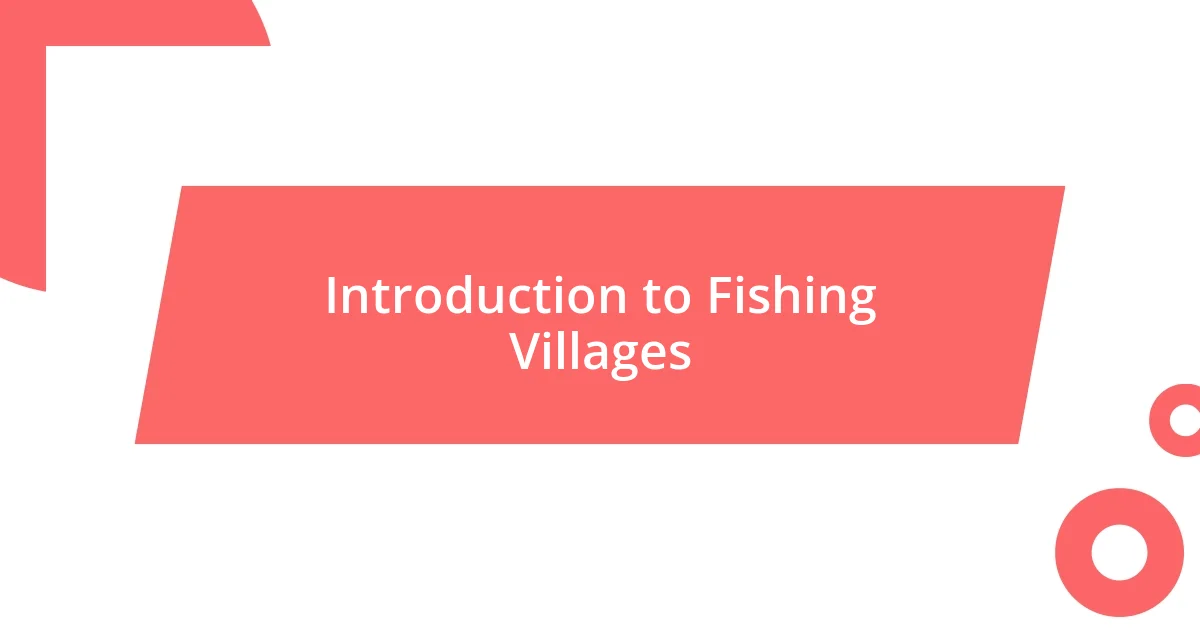
Introduction to Fishing Villages
Fishing villages have always fascinated me, with their unique blend of simplicity and culture. When I first visited a small fishing village, the salty air and the rhythmic sound of waves instantly transported me to a world where time seemed to stand still. It’s hard not to feel a sense of wonder when you see fishermen hauling in their nets, their weathered faces telling stories of the sea.
These villages, often tucked away from the bustling cities, thrive on a rich heritage closely tied to the ocean. I remember chatting with a local fisherman who shared his family’s multi-generational bond with the sea. His passion for fishing wasn’t just about sustenance; it was rooted in tradition and love. How could anyone not be touched by such a deep connection to their environment?
In my experience, the charm of fishing villages lies in their sense of community. Everyone knows each other, and there’s a palpable camaraderie in the air. Have you ever felt that warm sense of belonging in an unfamiliar place? It’s moments like these that remind us of the importance of preserving these vibrant cultures for future generations.
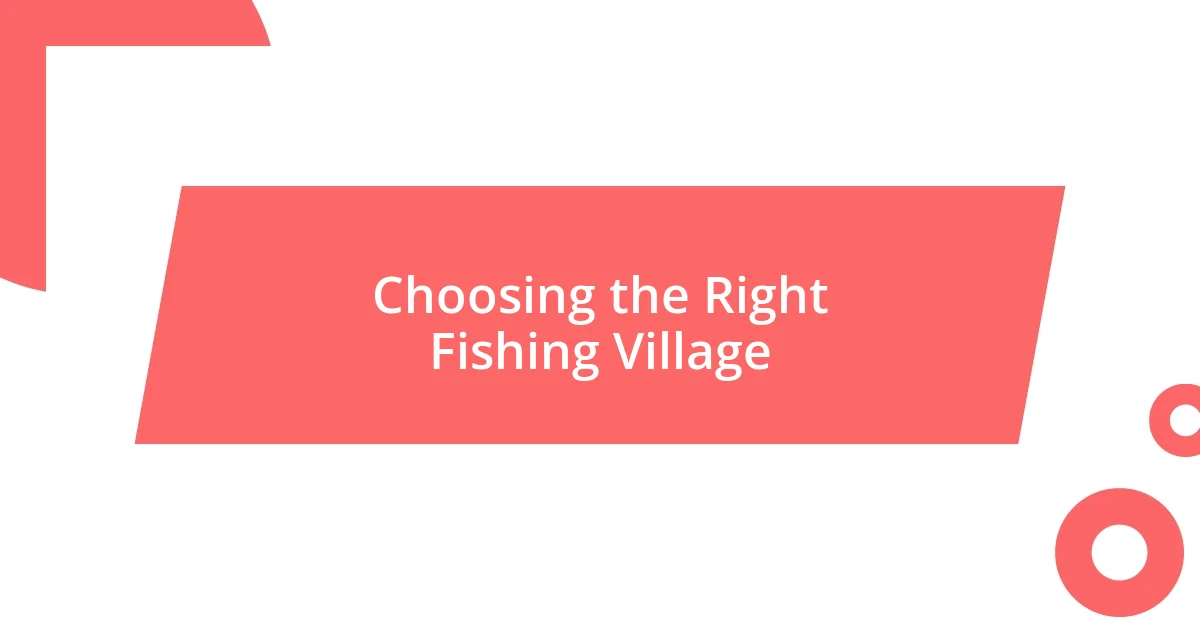
Choosing the Right Fishing Village
Choosing the right fishing village for your visit can be a delightful challenge. Each village has its own character and charm, shaped by local culture, traditions, and natural surroundings. When I traveled to a quaint fishing village in Maine, I was captivated by its vibrant fishing community and the stunning coastal views that made it a perfect getaway. It’s essential to consider what you’re hoping to experience before making your choice.
Here are some factors to help you decide:
- Accessibility: Is it easy to get to? Consider your travel preferences and distance from major cities.
- Community Engagement: Do you want to interact with locals? Some villages are more welcoming to visitors.
- Fishing Opportunities: Are you interested in fishing activities? Research the types of fishing available—deep-sea, fly-fishing, or even recreational.
- Cultural Activities: Look for villages that offer local festivals or events celebrating their maritime heritage.
- Scenic Beauty: What kind of views or natural landscapes do you prefer? Some places boast rugged coastlines while others feature serene beaches.
By reflecting on these elements, you’ll find a fishing village that aligns beautifully with your travel desires.
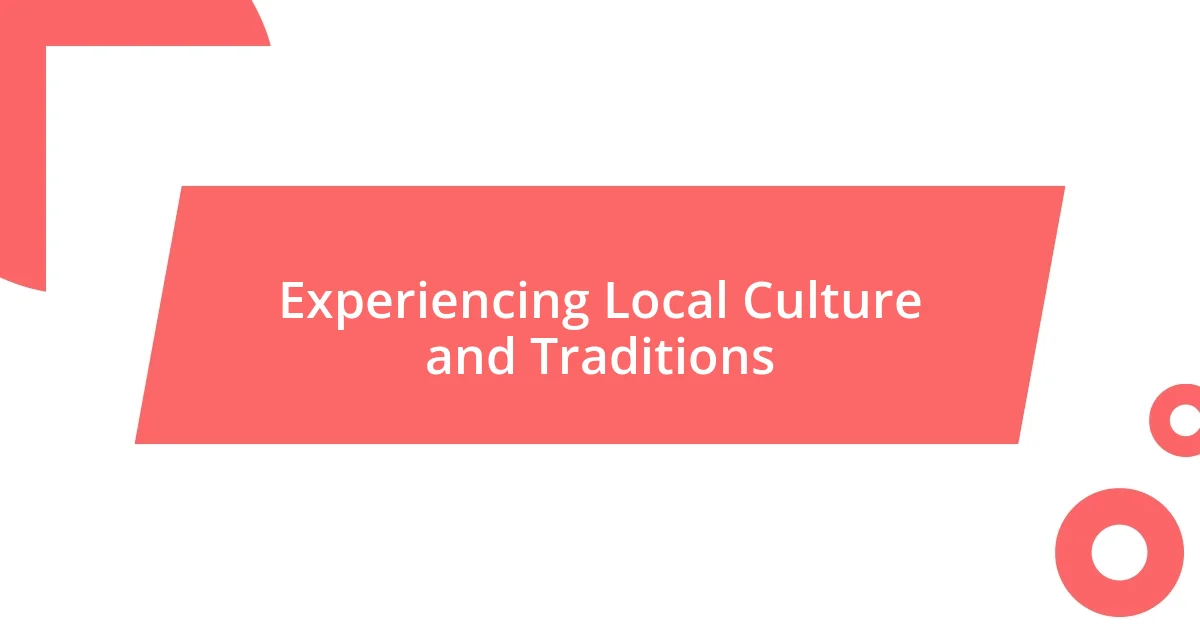
Experiencing Local Culture and Traditions
Experiencing local culture in fishing villages is like stepping into a unique tapestry of traditions. One afternoon, while attending a local seafood festival, I found myself enthralled by the lively music of fishermen Band, accompanied by vibrant dances. The laughter and joy of the community felt infectious. As I watched, I realized that these gatherings aren’t just celebrations of food; they are a way for the village to pass down stories, connect generations, and foster unity. Have you ever witnessed a tradition that made you feel part of something greater?
During another visit, I had the privilege of joining a family for dinner, where they prepared a traditional dish passed down through generations. As I savored the flavors, I couldn’t help but appreciate how every bite carried history and love. The villagers shared tales of their ancestors and the challenges they faced. These intimate moments personalized the experience for me, making the culture tangible and alive. In a world so focused on rapid connections, don’t you just cherish these slower, more meaningful interactions?
I also discovered that local craftsmanship is an integral part of the villages I visited. One afternoon, I joined a workshop where artisans taught visitors to weave fishing nets the traditional way. I found the meticulous process fascinating, reflecting the balance between practical skills and artistry. Those small connections to the fishing heritage resonated deeply with me. It serves to remind us that each tradition holds a piece of the community’s identity, don’t you think?
| Aspect | Fishing Villages |
|---|---|
| Cultural Expressions | Festivals and traditional gatherings |
| Food | Local dishes steeped in history |
| Craftsmanship | Artisanal skills, like net weaving |
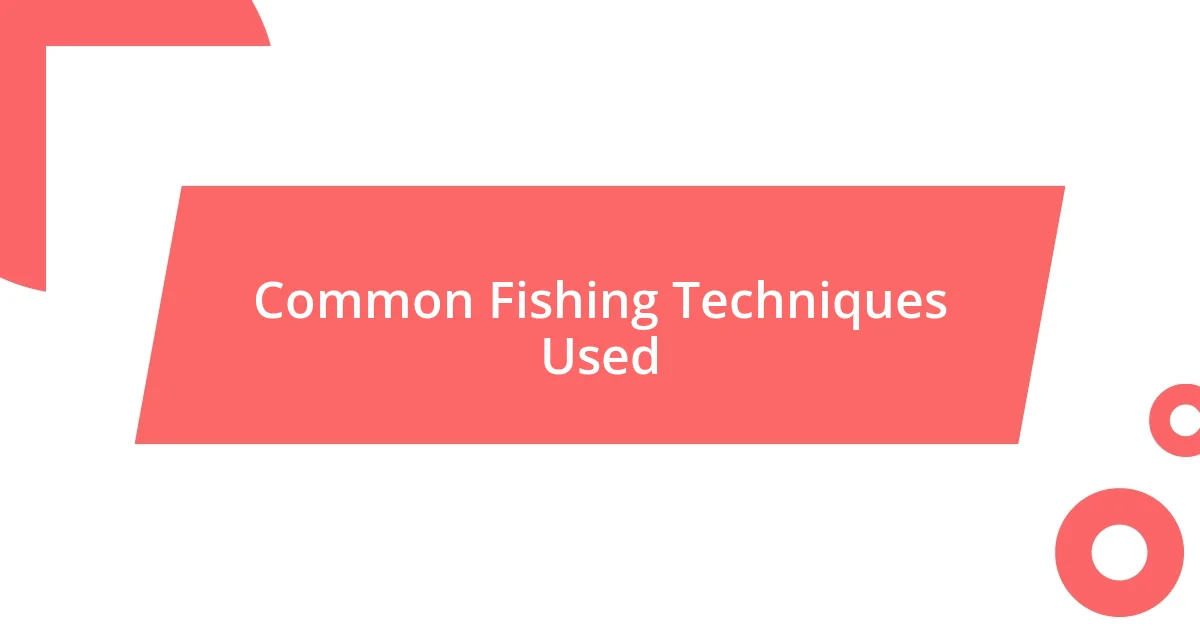
Common Fishing Techniques Used
Fishing techniques vary widely across different regions, reflecting both the local environment and the culture of the fishing village. In one coastal village, I experienced the art of gillnet fishing first-hand. Watching the fishermen skillfully deploy their nets was mesmerizing; it was a blend of tradition and precision, with each cast carefully timed to catch the day’s catch without disturbing the ecosystem. Have you ever felt that rush of excitement when you see a skillful technique in action?
Then there are the ever-popular methods like line fishing and trap fishing, which I encountered in another village. The fishermen used simple but effective wooden traps made from local materials, showcasing not only their resourcefulness but also their respect for the sea. I remember helping one of the locals set up these traps at dawn, the mist rising off the water. That moment felt like a secret shared between friends—the anticipation of what the sea would provide that day was palpable. Isn’t it incredible how fishing connects us to nature in such an intimate way?
And then there are the traditional fishing techniques that are slowly fading away but carry a rich history. One evening, I stumbled upon a group of elderly fishermen practicing the ancient method of spearfishing. Their stories echoed with tales from days gone by, filled with challenges and triumphs. I can still hear their laughter as they recounted that time one of them caught a fish so large it brought the whole village together in celebration. How wonderful is it to witness such a living history, embedded deeply in the very fabric of these communities?
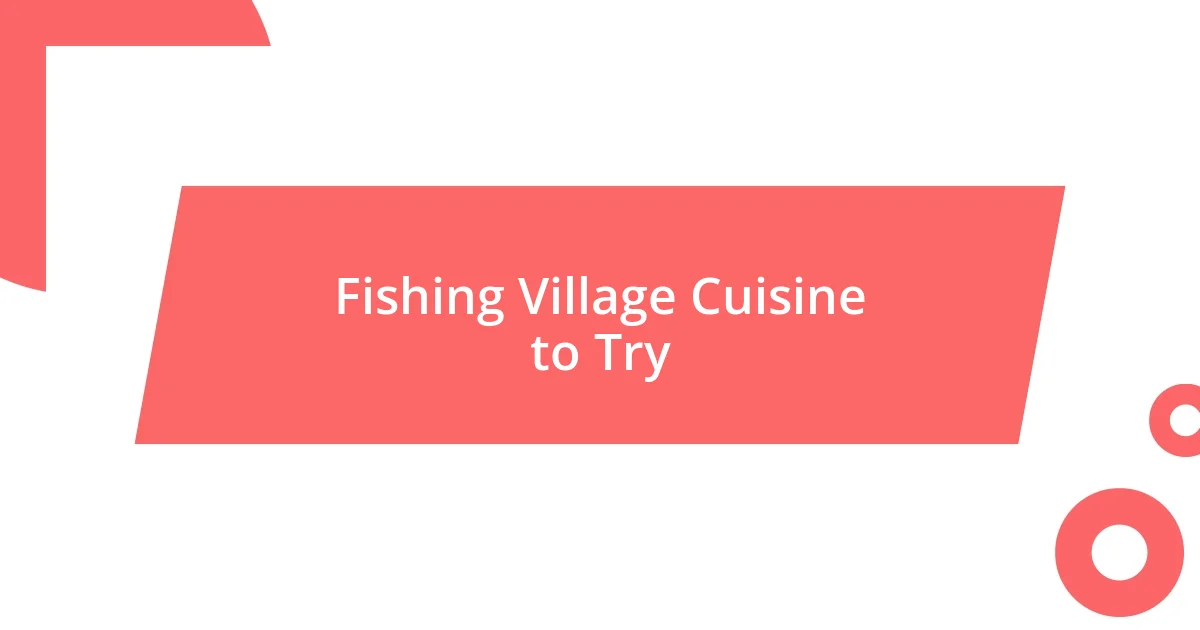
Fishing Village Cuisine to Try
There’s something extraordinary about savoring local dishes in fishing villages. One of my favorite meals was a bowl of clam chowder, made right from the day’s catch. As I dipped my spoon into the creamy broth, I was amazed by the fresh flavors—each slurp felt like a hug from the ocean. How could something so simple evoke such happiness?
Another memorable dish was the grilled fish, seasoned only with local herbs and lemon. I remember sitting under a starlit sky, the air filled with the smell of smoke and seasoning. When I took that first bite, I felt as if I had been transported back to the very waters where the fish had just been caught. Isn’t it fascinating how food can bridge cultures and convey stories across generations?
I can’t forget the unique experience of enjoying community-style meals where everyone shares dishes. The camaraderie around the table was palpable, with laughter and stories flowing as freely as the wine. It became clear to me that these meals were not just about nourishment; they were a celebration of togetherness and heritage. Have you ever felt that deep connection when dining with others? It’s those shared moments that deepen our appreciation for local cuisine and its roots.
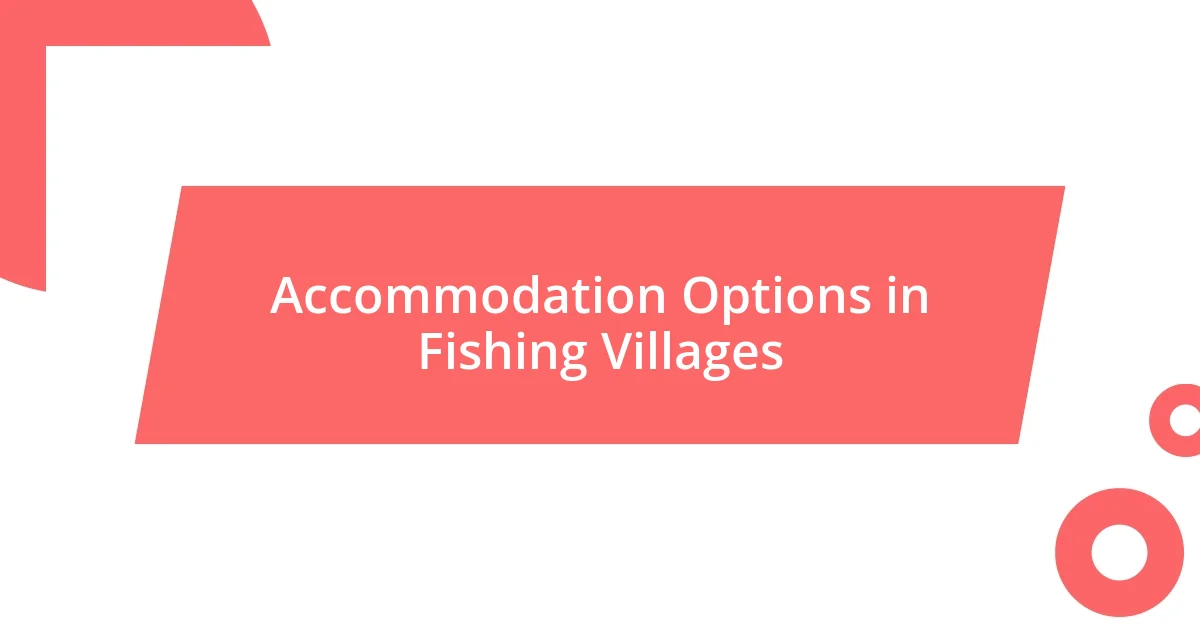
Accommodation Options in Fishing Villages
Accommodation options in fishing villages often blend functionality with charm. One memorable experience I had was staying in a cozy guesthouse run by a local family. The room was simple, yet the linens had that fresh, salty breeze scent—the kind that wraps around you like a warm hug after a long day out on the water. Have you ever felt that special connection when your host shares stories about the town over breakfast?
Another fascinating option I encountered was the traditional homestay, where I got to live alongside fishermen and their families. Imagine waking up to the sound of waves gently crashing, the aroma of fresh coffee brewing, and the excitement of preparing for a day at sea. It was like stepping into a different world, one where every moment felt intimate and personal. How incredible is it to wake up right in the heart of a community, surrounded by the hustle of local life?
There are also charming beach cottages and rustic cabins that provide a perfect escape. I once rented a little cabin with a porch overlooking the sea, where evenings were spent watching the sun dip below the horizon while listening to the distant calls of seabirds. That solitude mixed with natural beauty made for a peaceful retreat. Isn’t it amazing how a simple place can create lasting memories and feelings of tranquility?
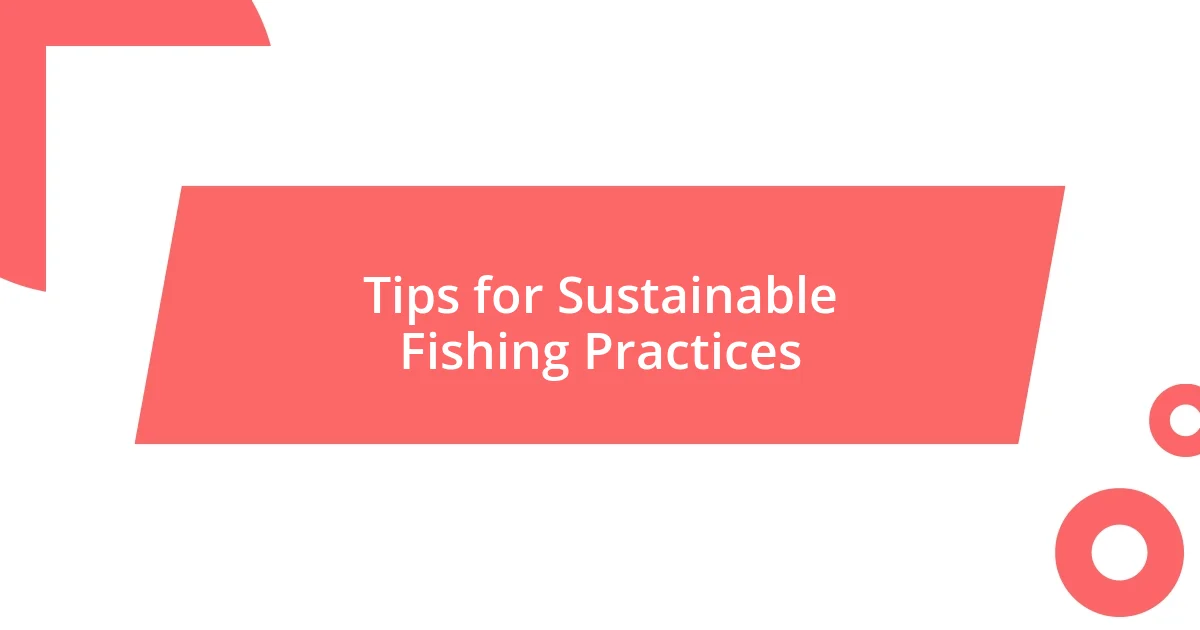
Tips for Sustainable Fishing Practices
Sustainable fishing practices are crucial not only for preserving marine life but also for ensuring that future generations can enjoy the magic of fishing villages. I remember visiting a local co-op where fishermen shared their commitment to using eco-friendly gear. They explained how avoiding harmful nets can minimize bycatch, keeping the ecosystem balanced. Isn’t it amazing to see how small changes can lead to significant benefits for our oceans?
Another strategy that truly resonated with me was the notion of catch limits based on community assessments. Once, while chatting with a group of fishermen, I learned how they set quotas together, reflecting the health of fish populations. This mutual responsibility fosters a sense of ownership and pride in their work. Have you ever thought about how empowering it feels to be part of something bigger, working towards a common goal?
Additionally, supporting local fisheries that practice sustainable methods makes a world of difference. I often seek out markets that source seafood responsibly, and it gives me a sense of fulfillment. It’s eye-opening to realize that our choices in what we buy can directly impact the very fishing communities we cherish. How satisfying is it to know that, just by making thoughtful decisions, we can help protect both the oceans and the vibrant cultures that depend on them?










